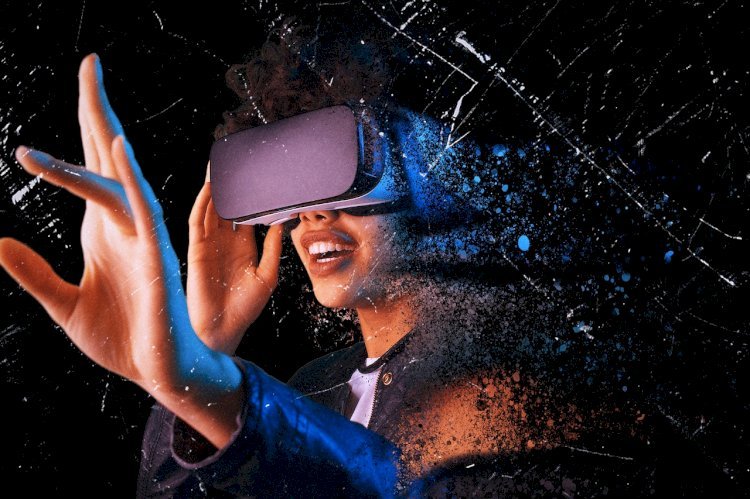Digital Entertainment in the UK 2025: Tools & Trends
Discover how digital entertainment is evolving in the UK in 2025—from AI and AR to virtual concerts, real-time gaming, and smart content creation tools.

The entertainment scene in the UK has always been world-renowned, but 2025 is showing up as a breakout year for innovations powering different ways we watch, stream, engage, play, and interact online. Digital entertainment is undergoing a revolution, driven by artificial intelligence, real-time interaction, augmented reality, and smart content creation tools.
A blend of global influence and home-grown talent has provided the UK with a front-row seat to this exciting new era of media. Here are the tools and technologies that are shaping the next generation of digital entertainment experiences.
Streaming Platforms Introduce New Tech

Every year sharpens the competition among video streaming platforms, and 2025 has been no exception. The tools they use are now central to the digital entertainment ecosystem.
Platforms like Netflix and Disney+ have pushed ahead with personalised previews, trailers, and content suggestions—all powered by AI analysing user behaviour. The BBC has taken experimentation further by developing branching narratives, giving users the option to control how a story ends. These dynamic experiences are increasing engagement and viewer satisfaction.
Behind the screen, advanced compression algorithms and codecs like Versatile Video Coding (VVC) are changing the game. Streaming services such as ITVX and BritBox now offer 4K quality streaming even in rural UK, thanks to these bandwidth-efficient technologies.
AI is also being used in subtitling, voice dubbing, and accessibility tools. For example, real-time captioning is now supported across several UK streaming services, bringing digital entertainment to a broader, more inclusive audience.
Online Entertainment With Real-Time Interactions

UK residents are now part of a growing trend of real-time digital entertainment. Online gaming, particularly in the gambling and casino sector, is evolving rapidly through interactive tech.
Players now interact with live dealers, experience real-time audience voting, and even chat with other users during gameplay. For a deeper dive into these online gaming trends, check out our detailed breakdown of how tech is transforming gameplay. These interactive sessions are far removed from traditional passive gaming. According to industry expert Viola D'Elia, immersive digital environments are replacing outdated interfaces in online casinos and live gaming studios.
Studios like Playtech and Evolution use 4K streaming, low-latency protocols, and multi-language support to replicate the feel of physical casino spaces. Gamers can now join avatar-based environments and enjoy entertainment with privacy, fluidity, and realism. If you're exploring these platforms, don't miss our expert guide on safe online casino bonuses to make smarter choices while playing.
For further insights on how these platforms are transforming the player experience through innovative tech, you can visit Esports Insider.
This trend extends beyond casinos—esports, livestreamed trivia, and real-time shopping experiences are now part of the UK’s mainstream digital entertainment menu.
Gaming Becomes Community-Driven and Location-Aware

Gaming is at the forefront of digital entertainment in 2025, and the UK is seeing some of the most exciting innovations in this space.
Games are now being designed with local relevance in mind. Augmented reality (AR) titles like the newest versions of Pokémon Go and Peridot are now location-aware in smaller towns, parks, and public areas across the UK—not just London landmarks. This decentralisation allows for more inclusive digital experiences.
On consoles and PCs, platforms like PlayStation and Xbox are improving matchmaking and cooperative features. Discord integrations and AI-powered community hubs allow players to discover new teams and friends effortlessly.
These social layers are made possible by robust cloud infrastructure like AWS and Microsoft Azure, which reduce latency and power real-time interaction. As of 2025, mobile gaming now makes up 48% of total UK gaming revenue, according to UKIE (UK Interactive Entertainment).
AI Changed the Content Creation Game

Artificial intelligence has become a cornerstone of digital entertainment, especially for content creators, influencers, and small production teams.
Creators across platforms are using tools like InVideo to turn AI-generated scripts into short-form videos, while apps like Pictory use voice cloning and synthetic voiceovers to add realism. Some of the most viral memes and short clips in 2025 involve AI-generated characters speaking in celebrity voices.
Platforms like Runway and Pika Labs are also used by production houses to edit footage, add effects, and suggest visual improvements automatically. These tools are cutting video editing time by over 50%, enabling faster output and higher productivity.
In Manchester, one independent studio created a multi-language short film using AI dubbing technology, making the content instantly accessible to audiences across five regions. However, concerns remain over copyright and ethical AI usage. The British Film Institute (BFI) recently raised red flags about AI scraping thousands of TV and film scripts for training, which poses risks to creative ownership.
Augmented Reality Improved Live Experiences

Festivals, concerts, and theatrical performances are now digitally enhanced, adding an AR layer to traditional events.
In 2025, venues like The Roundhouse in London are providing AR overlays via smart glasses and mobile devices. Attendees can access backstage feeds, real-time song lyrics, and interactive artist bios, even if seated far from the stage.
Meanwhile, the Royal Shakespeare Company has successfully integrated holographic projections into its plays. Viewers wearing AR headsets experience extra visual effects layered onto scenes, enriching the storytelling and creating a hybrid between theatre and digital art.
Outside London, similar tech is being piloted at events in Birmingham, Edinburgh, and Liverpool, allowing more regional audiences to enjoy these next-gen live experiences.
Social Media Entertainment Welcomes Speed

In the era of fast consumption, social media has become a key channel for digital entertainment. Platforms like TikTok, Instagram Reels, and YouTube Shorts are pushing creators to deliver content that’s short, sharp, and relevant.
UK creators are relying on tools like Descript and CapCut to edit clips, balance sound, and auto-generate subtitles in minutes. This allows for daily publishing, which is essential for audience growth in 2025.
On the backend, AI is being used to moderate comments in real-time, predict sentiment, and flag inappropriate visuals using image analysis. This has made platforms safer for users and advertisers alike.
Localization is another area of improvement. AI now better understands British humour, dialects, and cultural references, giving UK content a better chance of trending. Even creators with limited budgets can reach large domestic audiences thanks to smart algorithm tuning.
Online Performances Go Mainstream

Virtual gigs, once a necessity during lockdowns, have become a mainstream part of digital entertainment.
Musicians are performing in 3D environments on platforms like Roblox, Wave, and Fortnite. These events are more than livestreams—they offer interactivity, merchandise stores, and even audience-controlled lighting effects.
Some UK music labels have reported that virtual ticket sales in 2025 have exceeded traditional gig attendance, especially for mid-tier artists and fans living outside major cities.
In a recent virtual show hosted in collaboration with the O2 Academy Group, over 80,000 fans from around the world joined a live concert experience with interactive crowd audio and customisable avatars—setting new standards for global fan engagement.
Audio Entertainment Welcomes a New Level of Accessibility

Smart speakers are becoming intelligent companions in everyday digital entertainment.
New updates to devices like Amazon Echo and Google Nest allow users to ask for weather updates, podcast highlights, and football match reports using conversational prompts.
Apps like BBC Sounds, Audible, and Pocket Casts now offer curated playlists that respond to news cycles. For example, during the FA Cup, podcast feeds are automatically populated with relevant match talk, fan reactions, and tactical breakdowns.
Voice personalisation and AI-generated audio snippets are also gaining popularity, allowing users to create their own “newsrooms” or personalised audio timelines using smart filters.
Conclusion
It’s a great time to be curious in the UK. Whether you’re streaming a choose-your-own-adventure on the BBC, gaming with friends in an AR-enhanced park, or attending a virtual concert from your sofa, digital entertainment has become deeply embedded in everyday life.
These innovations—powered by AI, AR, cloud computing, and community engagement—are creating a more connected, immersive, and personalised entertainment landscape. As we move forward, the UK will continue to lead the charge, balancing innovation with inclusivity and creativity.
FAQs About Digital Entertainment in the UK
What is digital entertainment?
Digital entertainment includes any media experienced through digital platforms—streaming, gaming, AR, social content, and more.
How is AI used in digital entertainment?
AI helps create, edit, personalise, and translate content—boosting speed and accessibility.
Is digital entertainment growing in the UK?
Yes. The UK’s digital entertainment market is expanding rapidly across gaming, streaming, live events, and social media.
What technologies are transforming entertainment in 2025?
AI, AR, real-time interactivity, cloud streaming, and smart content tools are driving the biggest changes.
Can rural UK areas access quality digital content?
Absolutely. Advanced compression and cloud tools now allow seamless streaming and gaming in rural regions.

















